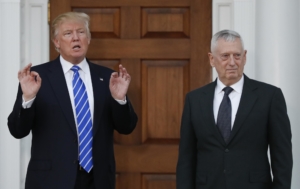By Stephen Noerper, Center for Strategic & International Studies–
As the US (and other governments) are rocked by discord over President Donald Trump’s immigration ban and scores of other departures from the policy norm, Defense Secretary Jim Mattis’ visit to Korea and Japan provided a calming salve. Given international concerns over new directions in US foreign and security policy, Secretary Mattis and his team demonstrated an ability to not only read the tea leaves, but sow new soil and reinforce existing foundations.
His message was clear and unambiguous: the United States would stand by those nations to which it is committed and stand up to aggression in the region. That message is useful not only to “lynchpin” allies Korea and Japan, but also a wary China and wayward North Korea. For China, despite its somewhat mild protestations over the trip, the US signaled it will stand its ground in defense of Japan and its island claims and seek resolution over the South China Sea dispute—but with diplomacy in the lead and force a backup. For North Korea, the US signaled that its nuclear and missile development is an immediate and shared concern, and that use of nuclear weapons would see an “overwhelming” response.
Mattis’ trip may be seen as historically significant in affording critical calm during a contentious time of transition in several capitols – Washington, Seoul (which has been rocked by the impeachment crisis of President Park Geun-hye), and Beijing, where Xi Jinping continues to consolidate power in advance of this year’s Party Congress. It is significant in signaling to North Korea and to China that the US alliance structure remains in place, and the United States’ disposition in East Asia remains firm.
As importantly, the visit will be seen in light of tenor and tone, both of heightened importance in the East Asian vernacular. Like a favorite uncle at family proceedings, Secretary Mattis voiced a much-needed maturity and resolve infused with sensitivity and sensibility. In Korea he spoke of his service with the First Marine Division – famous for one of American history’s most memorable battles, that of the Chosin Reservoir – cementing notions of an alliance borne in blood. In Korea and Japan, he stood beside defense ministers and prime ministers, deferential but determined in his statements of US support and shared concerns over regional security. Both Korean and Japanese press gave Mattis glowing reviews, perhaps the most striking synergy of press and policy making in 2017.
Finally, the visit will be noted historically for the unusual order – Korea first, Japan next – by which Mattis and his team proceeded. The point was clear: concern over developments north of the 38thparallel are paramount, and time is critical. No visits to the DMZ or troop visits; those will come. Mattis’ intent was crystal clear and well informed by his new team, including National Security Council senior director for Asia Matt Pottinger, a Marine and former journalist, knowledgeable and nuanced.
Policy observers question whether Trump has his defense chief’s back. By public accounts, the president holds Mattis in high esteem, altering his disposition toward water boarding after Mattis implied more ready results through beer, cigarettes, and a chat. Direct, thoughtful, engaged – all hallmarks of this first Asia trip. He hopefully will keep Trump on message, and the trip underscores the importance of the calming influence of a professional corps for follow-on, adding significance to naming assistant secretaries at Defense and State.
The trip too afforded polish to Secretary of State Rex Tillerson’s confirmation hearing suggestion of blockades in the South China Sea: try dialogue before direct action. The two may bring a hopeful focus and strength reminiscent of the George H.W. Bush foreign and security policy team, which faced its own perils and predicaments with the Cold War’s end. 2017 stands as critical as 1991, when managing a fractious Northeast Asia – defined by a nuclear North Korea and Sino-US discord over Taiwan and territories – constitutes the core of managing war and peace.
Dr. Stephen Noerper (stephen.noerper@koreasociety.org) is a senior director at the US nonprofit, Korea Society, and an adjunct associate professor at Columbia University.
PacNet commentaries and responses represent the views of the respective authors. Alternative viewpoints are always welcomed and encouraged.


Leave A Comment
You must be logged in to post a comment.